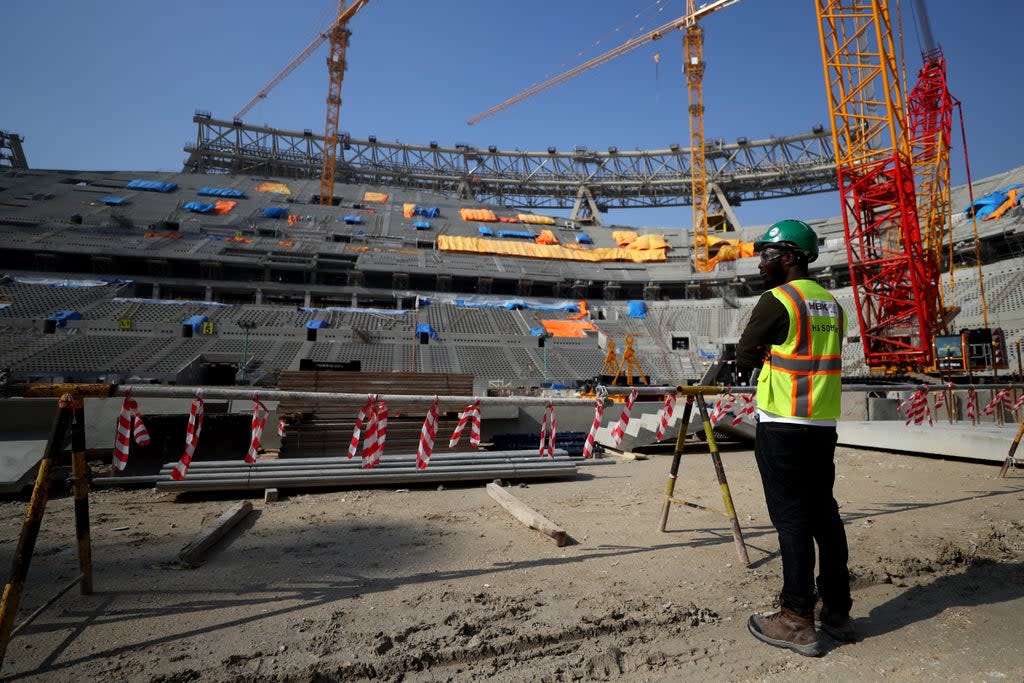Amnesty says FIFA and Qatar must pay £355m to ‘abused’ migrant World Cup workers

FIFA should pay at least $440million (£355.1m) in reparations to the hundreds of thousands of migrant workers who have suffered human rights abuses during preparations for the Qatar World Cup, a new report by Amnesty International has said.
The figure, which is the same as the World Cup's total prize fund, would compensate workers and their families for unpaid wages, recruitment fees, injuries and deaths while working on the stadiums and related infrastructure projects for tournament since 2010.
Amnesty's report was released on Thursday to mark six months until the tournament's opening game between Senegal and the Netherlands on November 21.
The human rights organisation said the sum could end up being much higher and represents only a fraction of the estimated $6billion (£4.84bn) revenue FIFA is expected to make from the month-long tournament.
"This amount reflects a likely ‘floor’ for the scale of the harms suffered, in addition to the need to invest in programmes to ensure that abuses are not repeated in the future," read the report.
The 62-page report also called on Qatar to compensate workers, saying the country, which has a sovereign wealth fund worth an estimated $450bn (£363bn), "is obliged to ensure remedy for all abuses on its territory, whether linked to the World Cup or not".
Agnes Callamard, Amnesty International’s secretary general, said the amount of compensation being called for was “entirely justifiable" given the scale of the abuse.
She added: “For years, the suffering of those who made this World Cup possible has been brushed under the carpet. It is about time FIFA and Qatar came together to work on a comprehensive remediation programme that puts workers at its centre and ensures that no harm remains unaddressed.
“Under international law and by FIFA’s own rulebook, both Qatar and FIFA have obligations and responsibilities respectively to prevent human rights abuses and provide remedy to victims."
Amnesty also called on the Football Association and England manager Gareth Southgate to publicly back their calls for compensation.
Southgate has previously said workers' rights are one of the “areas of concern" around the tournament and acknowledged that Qatari laws to protect workers have not been fully enforced. The England squad, who face a Nations League triple-header at the start of next month, are planning to make a stand to raise awareness of the issues, possibily in collaboration with other European countries.
“International football can easily afford to do the right thing here," said Sacha Deshmukh, Amnesty International UK’s CEO in calling for the FA's support.
"This is a comparatively small share of FIFA’s enormous prize money pot - and it would provide some real redress for the serious human rights violations that underpin this tournament."
In compiling the report, Amnesty drew on over a decade of investigating labour abuses in Qatar, as well as reports from other human rights organisations and FIFA's own documents.
Since controversially being awarded the World Cup in 2010, Qatar has introduced a number of labour reforms and improvements for workers.
However, Amnesty says a widespread lack of enforcement of the new laws mean abuses still persist, while the improvements for workers "only cover a minority of the hundreds of thousands of workers on World Cup-related projects".
In response, FIFA said in a statement it was “implementing an unprecedented due diligence", adding: “FIFA and Qatar’s Supreme Committee for Delivery & Legacy (SC) have put in place their own grievance mechanisms and have required companies operating in the context of the FIFA World Cup to do the same."
The world governing body added that workers had already received at least $22.6m in repayment of recruitment fees, with a further $5.7m to come from employers.
The FA says it is in dialogue with Amnesty, FIFA, UEFA and other organisations to ensure England participate in the tournament “in a socially responsible way".

 Yahoo Movies
Yahoo Movies 
